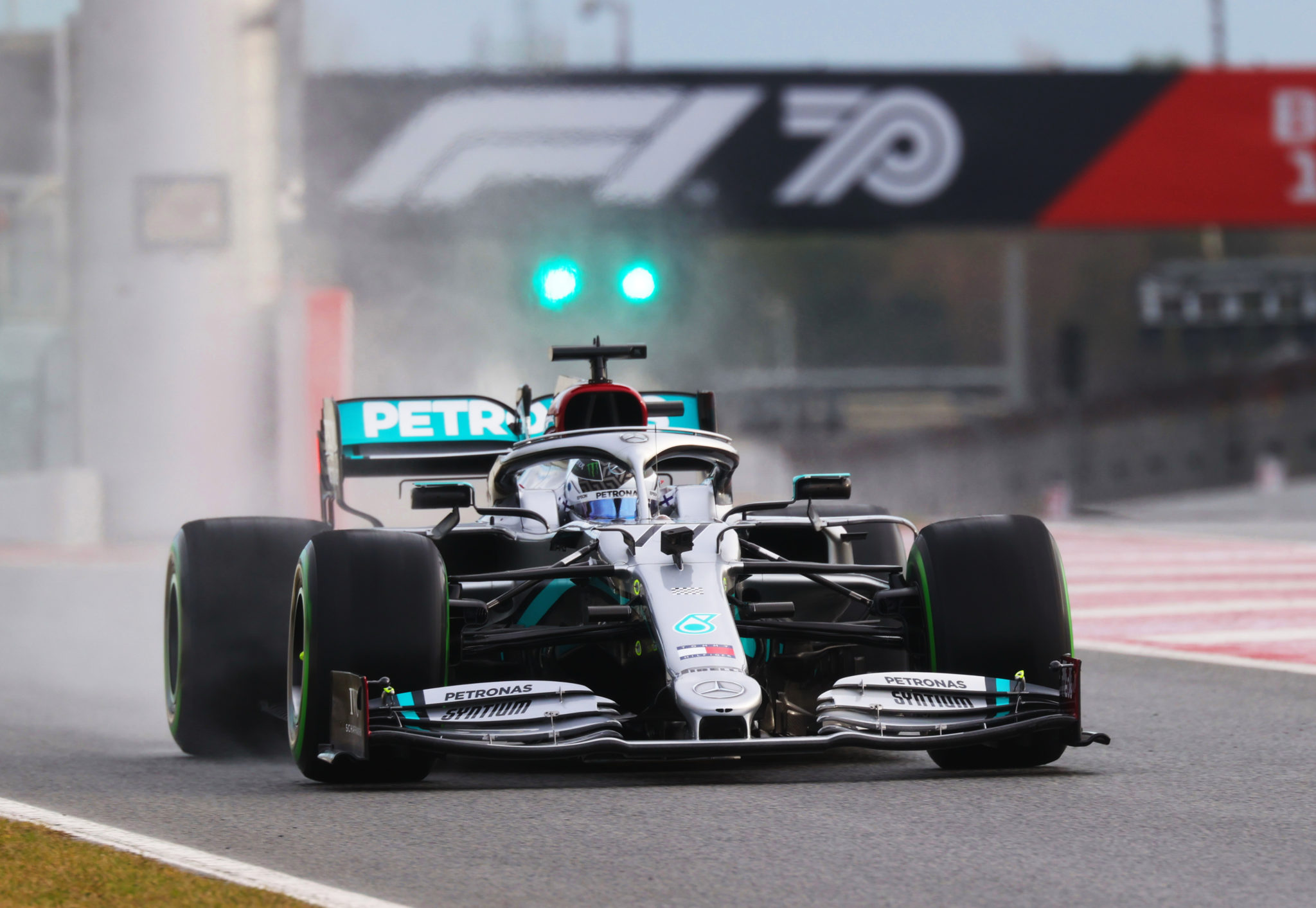
Valterri Bottas pilots the Mercedes-AMG Petronas Formula 1 race car during wet Pre-Season Testing
Mercedes-AMG HPP Engineers helped speed breathing aids to COVID-19 patients in need this week. The Mercedes-AMG Formula 1 engineers are used to working under pressure with “a deadline every minute.” We at Napleton.news know from firsthand experience, having watched how quickly a project can jump from the computer terminal to trackside in a matter of hours. Working under the Project Pitlane initiative, these same Formula 1 engineers have helped to develop a breathing aid that can keep COVID-19 patients out of intensive care.
For such an effort, Mercedes-AMG Formula 1 engineers joined with mechanical engineers at the University College London (UCL) and UCLHospitals (UCLH), to combat the Coronavirus pandemic afflicting patients around the globe.
Mechanical engineers from the colleges joined the Mercedes-AMG High Performance Powertrain (HPP) engineering team responsible for powering the six-time world championship-winning Mercedes-AMG Petronas Formula 1 race cars to modify a breathing aid to keep COVID-19 patients out of intensive care. The modifications have been approved by the U.K. National Health Services (NHS).
Andy Cowell, Managing Director of Mercedes-AMG HPP said, “the Formula One community has shown an impressive response, coming together in the Project Pitlane collective to support the national need at this time across a number of different projects. We have been proud to put our resources at the service of UCL to deliver the CPAP project to the highest standards and in the fastest possible timeframe.”
The breathing aid, known as a Continuous Positive Airway Pressure (CPAP) device, is normally used to help fight a condition known as Sleep Apnea. During the recent coronavirus episodes in Italy and China, hospitals have used it to help COVID-19 patients with more advanced lung infections to ease their breathing when oxygen alone is not sufficient. The CPAP device is fairly common in North America. You probably know some friends or family who use it, as needed, to avoid snoring.
Since Wednesday, March 18, engineers at UCL and Mercedes-AMG HPP worked around the clock to reverse engineer a device that can be produced quickly by the thousands. From the initial meetings to production of the first device, the team was able to complete the task in under 100 hours. It has now been recommended for use by Britain’s Medicines and Healthcare Products Regulatory Agency (MHRA), which is similar to the U.S.’s Food and Drug Administration (FDA). UCLH received 100 devices for clinical trials followed by a rapid roll-out to U.K. hospitals ahead of the predicted surge of COVID-19 diagnoses.
The collaboration between the organizations displayed what happens when teaching hospitals, health services and industry get together to defeat a common enemy; in this case, the coronavirus. Such a partnership enabled vital technologies to be fast-tracked for patients who require respiratory support.
British medical consultants are aware of reports from Italy stating approximately 50-percent of patients treated with the CPAP devices have avoided using “invasive mechanical ventilation” or ventilators as they are more commonly known. That’s a good thing because such ventilators are in short supply in the U.K.
Professor Rebecca Shipley, Director of UCL Institute of Healthcare Engineering, said: “At UCL, we have an established ecosystem of partnerships spanning (motorsport) engineers, healthcare and industry ready to be mobilized in times of need
Professor Tim Baker (UCL Mechanical Engineering) said: “Given the urgent need, we are thankful that we were able to reduce a process that could take years down to a matter of days. Using computer simulations, we improved the device further to create a state-of-the-art version suited to mass production,” he said. “We were privileged to be able to call on the capability of Formula One – a collaboration made possible by the close links between UCL’s Mechanical Engineering school and Mercedes-AMG HPP.”
Project Pitlane is a collective of UK-based Formula 1 racing teams and their respective technology arms coordinating a response to the U.K. government’s call for assistance with the manufacture of medical devices. It will pool the resources and capabilities of its member teams, focusing on the core skills of the F1 industry: rapid design, prototype manufacture, test and skilled assembly. F1’s ability to respond rapidly to engineering and technological challenges allows the group to add value to the wider engineering industry’s response.
You won’t likely see a reverse-engineered CPAP device in the showroom of Mercedes-Benz of Rochester, but you will see the latest technology available from Mercedes-Benz and AMG. Stop by to find out more about Mercedes technology and their practical applications today.
This post was published on April 2, 2020
The new Lexus TX 350 is taking up space. Not in a bad sense but… Read More
Destined for the cutting room floor after model year 2023, the Chrysler 300 makes its… Read More
Napleton Automotive Video Review Maserati Levante Napleton Automotive is loving the Maserati Levante Luxury SUV!… Read More
The Mercedes-AMG SL55 Roadster is something else. Not content to be a standard drop top… Read More
Shopping for a new vehicle with good options at a great price point? Napleton Automotive… Read More
The Kia K5 Sedan, in a world of SUVs, still shines In a world of… Read More